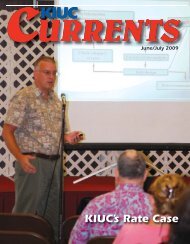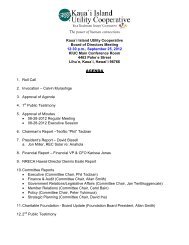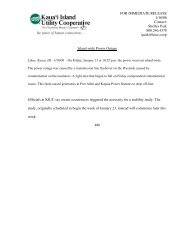- Page 1 and 2:
11401 Lamar Black & Veatch Corporat
- Page 3 and 4:
Page 3 Kaua’i Island Utility Coop
- Page 5 and 6:
Principal Investigators: Ryan Pletk
- Page 7 and 8:
Kaua’i Island Utility Cooperative
- Page 9 and 10:
Kaua’i Island Utility Cooperative
- Page 11 and 12:
Kaua’i Island Utility Cooperative
- Page 13 and 14:
Kaua’i Island Utility Cooperative
- Page 15 and 16:
Kaua’i Island Utility Cooperative
- Page 17 and 18:
Kaua’i Island Utility Cooperative
- Page 19 and 20:
Kaua’i Island Utility Cooperative
- Page 21 and 22:
Kaua’i Island Utility Cooperative
- Page 23 and 24:
Kaua’i Island Utility Cooperative
- Page 25 and 26:
Kaua’i Island Utility Cooperative
- Page 27 and 28:
Kaua’i Island Utility Cooperative
- Page 29 and 30:
Kaua’i Island Utility Cooperative
- Page 31 and 32:
Kaua’i Island Utility Cooperative
- Page 33 and 34:
Kaua’i Island Utility Cooperative
- Page 35 and 36:
Kaua’i Island Utility Cooperative
- Page 37 and 38:
Kaua’i Island Utility Cooperative
- Page 39 and 40:
Kaua’i Island Utility Cooperative
- Page 41 and 42:
Kaua’i Island Utility Cooperative
- Page 43 and 44:
Kaua’i Island Utility Cooperative
- Page 45 and 46:
Kaua’i Island Utility Cooperative
- Page 47 and 48:
Kaua’i Island Utility Cooperative
- Page 49 and 50:
Kaua’i Island Utility Cooperative
- Page 51 and 52:
Kaua’i Island Utility Cooperative
- Page 53 and 54:
Kaua’i Island Utility Cooperative
- Page 55 and 56:
Kaua’i Island Utility Cooperative
- Page 57 and 58:
Kaua’i Island Utility Cooperative
- Page 59 and 60:
Kaua’i Island Utility Cooperative
- Page 61 and 62:
Kaua’i Island Utility Cooperative
- Page 63 and 64:
Kaua’i Island Utility Cooperative
- Page 65 and 66:
Kaua’i Island Utility Cooperative
- Page 67 and 68:
Kaua’i Island Utility Cooperative
- Page 69 and 70:
Kaua’i Island Utility Cooperative
- Page 71 and 72:
Kaua’i Island Utility Cooperative
- Page 73 and 74:
Kaua’i Island Utility Cooperative
- Page 75 and 76:
Kaua’i Island Utility Cooperative
- Page 77 and 78:
Kaua’i Island Utility Cooperative
- Page 79 and 80:
Kaua’i Island Utility Cooperative
- Page 81 and 82:
Kaua’i Island Utility Cooperative
- Page 83 and 84:
Kaua’i Island Utility Cooperative
- Page 85 and 86:
Kaua’i Island Utility Cooperative
- Page 87 and 88:
Kaua’i Island Utility Cooperative
- Page 89 and 90:
Kaua’i Island Utility Cooperative
- Page 91 and 92:
Kaua’i Island Utility Cooperative
- Page 93 and 94:
Kaua’i Island Utility Cooperative
- Page 95 and 96:
Kaua’i Island Utility Cooperative
- Page 97 and 98:
Kaua’i Island Utility Cooperative
- Page 99 and 100:
Kaua’i Island Utility Cooperative
- Page 101 and 102:
Kaua’i Island Utility Cooperative
- Page 103 and 104:
Kaua’i Island Utility Cooperative
- Page 105 and 106:
Kaua’i Island Utility Cooperative
- Page 107 and 108:
Kaua’i Island Utility Cooperative
- Page 109 and 110:
Kaua’i Island Utility Cooperative
- Page 111 and 112:
Kaua’i Island Utility Cooperative
- Page 113 and 114:
Kaua’i Island Utility Cooperative
- Page 115 and 116:
Kaua’i Island Utility Cooperative
- Page 117 and 118:
Kaua’i Island Utility Cooperative
- Page 119 and 120:
Kaua’i Island Utility Cooperative
- Page 121 and 122:
Kaua’i Island Utility Cooperative
- Page 123 and 124:
Kaua’i Island Utility Cooperative
- Page 125 and 126:
Kaua’i Island Utility Cooperative
- Page 127 and 128:
Kaua’i Island Utility Cooperative
- Page 129 and 130:
Kaua’i Island Utility Cooperative
- Page 131 and 132:
Kaua’i Island Utility Cooperative
- Page 133 and 134:
Kaua’i Island Utility Cooperative
- Page 135 and 136:
Kaua’i Island Utility Cooperative
- Page 137 and 138:
Kaua’i Island Utility Cooperative
- Page 139 and 140:
Kaua’i Island Utility Cooperative
- Page 141 and 142:
Kaua’i Island Utility Cooperative
- Page 143 and 144:
Kaua’i Island Utility Cooperative
- Page 145 and 146:
Kaua’i Island Utility Cooperative
- Page 147 and 148:
Kaua’i Island Utility Cooperative
- Page 149 and 150:
Kaua’i Island Utility Cooperative
- Page 151 and 152:
Kaua’i Island Utility Cooperative
- Page 153 and 154:
Kaua’i Island Utility Cooperative
- Page 155 and 156:
Kaua’i Island Utility Cooperative
- Page 157 and 158:
Kaua’i Island Utility Cooperative
- Page 159 and 160:
Kaua’i Island Utility Cooperative
- Page 161 and 162:
Kaua’i Island Utility Cooperative
- Page 163 and 164:
Kaua’i Island Utility Cooperative
- Page 165 and 166:
Kaua’i Island Utility Cooperative
- Page 167 and 168:
Kaua’i Island Utility Cooperative
- Page 169 and 170:
Kaua’i Island Utility Cooperative
- Page 171 and 172:
Kaua’i Island Utility Cooperative
- Page 173 and 174:
Kaua’i Island Utility Cooperative
- Page 175 and 176:
Kaua’i Island Utility Cooperative
- Page 177 and 178:
Kaua’i Island Utility Cooperative
- Page 179 and 180:
Kaua’i Island Utility Cooperative
- Page 181 and 182:
Kaua’i Island Utility Cooperative
- Page 183 and 184:
Kaua’i Island Utility Cooperative
- Page 185 and 186:
Kaua’i Island Utility Cooperative
- Page 187 and 188:
Kaua’i Island Utility Cooperative
- Page 189 and 190:
Kaua’i Island Utility Cooperative
- Page 191 and 192:
Kaua’i Island Utility Cooperative
- Page 193 and 194:
Kaua’i Island Utility Cooperative
- Page 195 and 196:
Kaua’i Island Utility Cooperative
- Page 197 and 198:
Kaua’i Island Utility Cooperative
- Page 199 and 200:
Kaua’i Island Utility Cooperative
- Page 201 and 202:
Kaua’i Island Utility Cooperative
- Page 203 and 204:
Kaua’i Island Utility Cooperative
- Page 205 and 206:
Kaua’i Island Utility Cooperative
- Page 207 and 208:
Kaua’i Island Utility Cooperative
- Page 209 and 210:
Kaua’i Island Utility Cooperative
- Page 211 and 212:
Kaua’i Island Utility Cooperative
- Page 213 and 214:
Kaua’i Island Utility Cooperative
- Page 215 and 216:
Kaua’i Island Utility Cooperative
- Page 217 and 218:
Kaua’i Island Utility Cooperative
- Page 219 and 220:
Kaua’i Island Utility Cooperative
- Page 221 and 222:
Kaua’i Island Utility Cooperative
- Page 223 and 224:
Kaua’i Island Utility Cooperative
- Page 225 and 226:
Kaua’i Island Utility Cooperative
- Page 227 and 228:
Kaua’i Island Utility Cooperative
- Page 229 and 230:
Kaua’i Island Utility Cooperative
- Page 231 and 232:
Kaua’i Island Utility Cooperative
- Page 233 and 234:
Kaua’i Island Utility Cooperative
- Page 235 and 236:
Kaua’i Island Utility Cooperative
- Page 237 and 238:
Kaua’i Island Utility Cooperative
- Page 239 and 240:
Kaua’i Island Utility Cooperative
- Page 241 and 242:
Kaua’i Island Utility Cooperative
- Page 243 and 244: Kaua’i Island Utility Cooperative
- Page 245 and 246: Kaua’i Island Utility Cooperative
- Page 247 and 248: Kaua’i Island Utility Cooperative
- Page 249 and 250: Kaua’i Island Utility Cooperative
- Page 251 and 252: Kaua’i Island Utility Cooperative
- Page 253 and 254: Kaua’i Island Utility Cooperative
- Page 255 and 256: Kaua’i Island Utility Cooperative
- Page 257 and 258: Kaua’i Island Utility Cooperative
- Page 259 and 260: Kaua’i Island Utility Cooperative
- Page 261 and 262: Kaua’i Island Utility Cooperative
- Page 263 and 264: Kaua’i Island Utility Cooperative
- Page 265 and 266: Kaua’i Island Utility Cooperative
- Page 267 and 268: Kaua’i Island Utility Cooperative
- Page 269 and 270: Kaua’i Island Utility Cooperative
- Page 271 and 272: Kaua’i Island Utility Cooperative
- Page 273 and 274: Kaua’i Island Utility Cooperative
- Page 275 and 276: Kaua’i Island Utility Cooperative
- Page 277 and 278: Kaua’i Island Utility Cooperative
- Page 279 and 280: Kaua’i Island Utility Cooperative
- Page 281 and 282: Kaua’i Island Utility Cooperative
- Page 283 and 284: Kaua’i Island Utility Cooperative
- Page 285 and 286: Kaua’i Island Utility Cooperative
- Page 287 and 288: Kaua’i Island Utility Cooperative
- Page 289 and 290: Kaua’i Island Utility Cooperative
- Page 291 and 292: Kaua’i Island Utility Cooperative
- Page 293: Kaua’i Island Utility Cooperative
- Page 297 and 298: Kaua’i Island Utility Cooperative
















